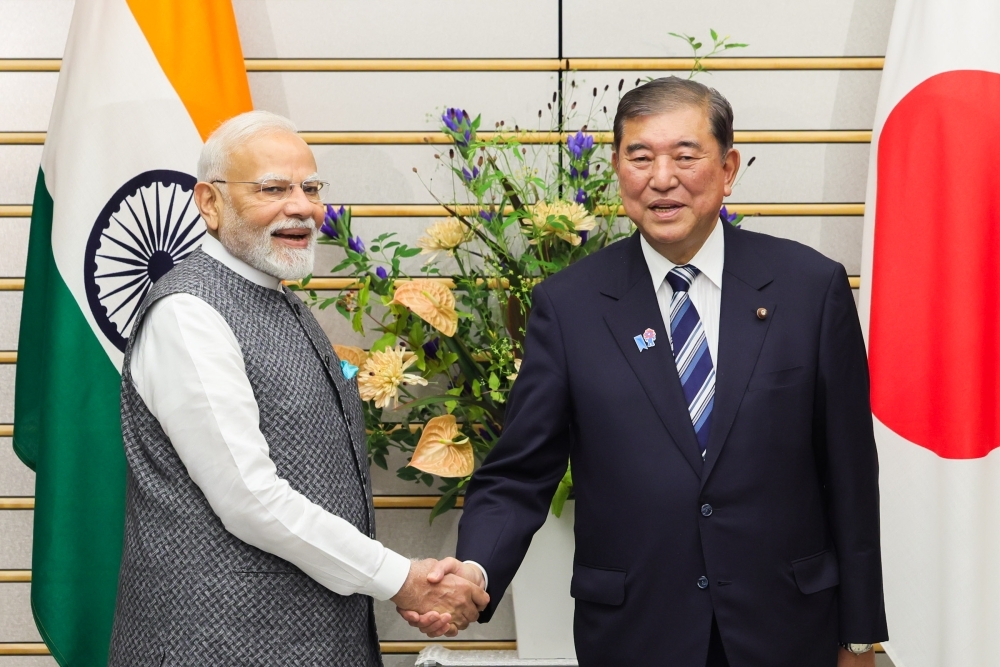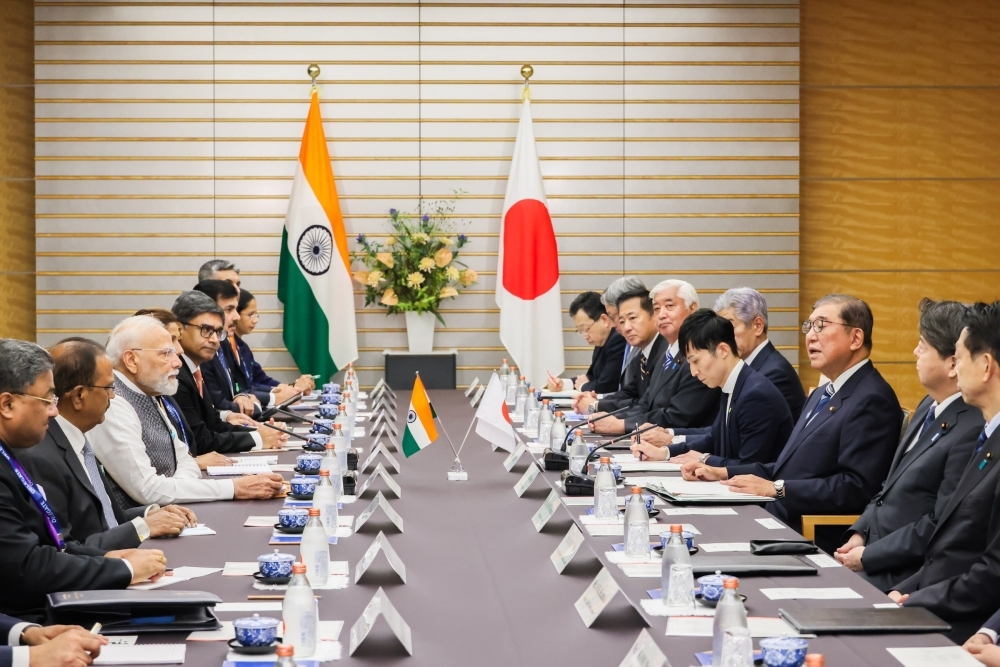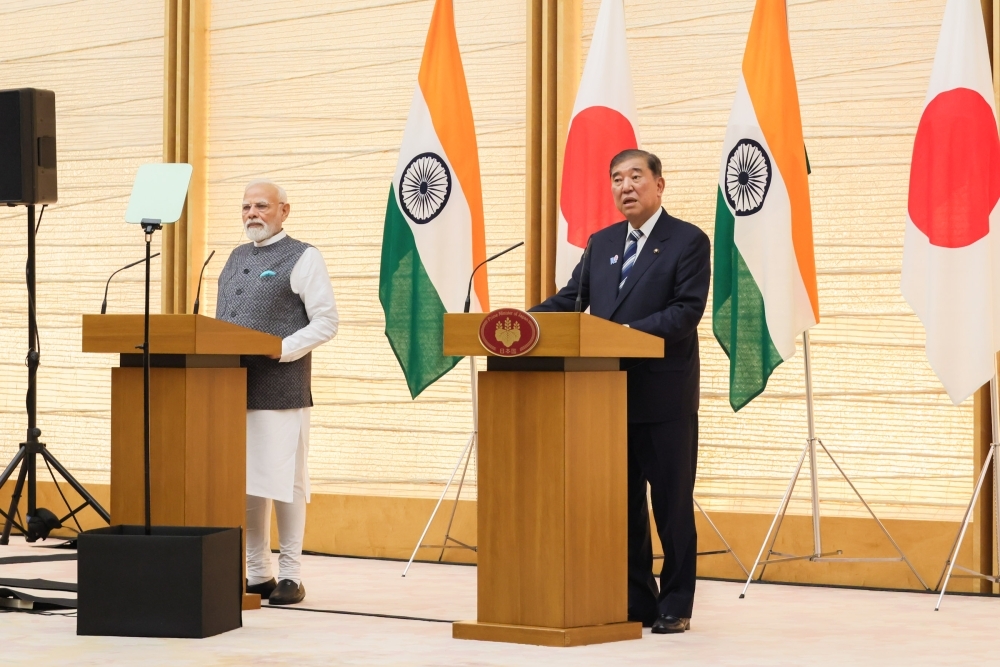Japan-India Relations
Japan-India Summit Meeting and Working Dinner
 (Photo: Cabinet Public Affairs Office)
(Photo: Cabinet Public Affairs Office)
 (Photo: Cabinet Public Affairs Office)
(Photo: Cabinet Public Affairs Office)
 (Photo: Cabinet Public Affairs Office)
(Photo: Cabinet Public Affairs Office)
On Friday 29, commencing at 6:15 p.m. for approximately 90 minutes, Mr. ISHIBA Shigeru, Prime Minister of Japan, held a summit meeting with H.E. Mr. Narendra Modi, Prime Minister of India, who is visiting Japan. Following the meeting, the two leaders issued outcome documents including the “Japan-India Annual Summit Joint Statement” and the “Japan-India Joint Vision for the Next Decade” and held a joint press occasion. Then, following the joint press occasion, commencing at 8:10 p.m. for approximately 60 minutes, a working dinner was held. The overview is as follows. At the Working Dinner, topics such as Prime Minister ISHIBA's past visit to India were discussed, providing an opportunity to deepen the personal relationship between the two leaders.
1. Opening Remarks
Prime Minister ISHIBA sincerely welcomed Prime Minister Modi’s visit to Japan, stated that ten years have passed since his first visit to Japan as Prime Minister in September 2014 and the concurrence between Japan and India to elevate their relationship to a “Special Strategic and Global Partnership,” and mentioned that Japan-India relations have made great progress during this period. Prime Minister ISHIBA also stated that the cooperative relationship between the two countries holds great potential for further advancing such progress and that he hopes to use this visit as an opportunity to communicate the direction of cooperation for the next decade to further elevate bilateral relations to new heights.
In response, Prime Minister Modi expressed his gratitude for the warm welcome extended by the Japanese side and stated that he would like to further develop bilateral relations as a “Special Strategic and Global Partnership” and strengthen Japan-India relations on a wide –range of fields.
Moreover, the two leaders concurred that both Japan and India will leverage their respective strengths and build a mutually complementary relationship that co-creates the socio-economic values needed to resolve the challenges that future generations will face.
2. Security and Defense
- Both leaders welcomed the revision of the “Joint Declaration on Security Cooperation between Japan and India” announced in 2008 and confirmed that, as the security environment surrounding Japan and India is becoming increasingly severe, Japan and India will share greater responsibility toward the common goal of peace and stability in the Indo-Pacific.
- In the areas of defense equipment and technology, both leaders welcomed the progress that has been made in coordinating the realization of the transfer of the Unified Complex Radio Antenna (“UNICORN”) to the Indian Navy and concurred to support the early realization of the transfer.
- Both leaders stated that the strategic importance in the field of economic security is also increasing, and, in order to strengthen cooperation between the two countries, including the resilience of supply chains for critical materials, they launched the Japan-India “Economic Security Initiative” and issued a Fact Sheet that indicates concrete initiatives by industry, academia, and government.
3. Economy, Investment and Innovation
- The two leaders welcomed that the 5-trillion-yen target of public and private investment and financing from Japan to India over five years, set in 2022, was achieved in three years. To support such private sector initiatives, they concurred to set a new target of 10 trillion yen in private investment to India and to continue working on improving the business environment.
- Both leaders shared a recognition of the importance of expanding the range of cooperation centered on semiconductors and AI, and welcomed the launch of the “Japan-India Digital Partnership 2.0” and the “Japan-India AI Cooperation Initiative (JAI).” They also confirmed support for Japanese startup companies’ business expansion in India and the promotion of space cooperation.
- The two leaders welcomed the signing of a memorandum of cooperation on the establishment of Joint Crediting Mechanism (JCM) and a joint statement of intent on hydrogen and ammonia.
- Both leaders concurred to continue cooperation toward the realization of the high speed rail project, which is a flagship project of Japan and India. They also concurred to launch a new “Next-Generation Mobility Partnership” with the aim of further strengthening Japan-India cooperation in the mobility field and developing cooperation from perspectives such as disaster risk reduction and resilience, digital and smart technologies, and next-generation energy.
4. People-to-People Exchanges
- The two leaders announced the Japan-India Human Resource Exchange Initiative under the recognition that there is still room for growth in people-to-people exchanges between Japan and India relative to the closeness of Japan-India relations. This initiative is expected to promote the development, exchange, and circulation of mutually complementary human resources between Japan and India, including leveraging the capabilities of highly skilled professionals and other Indian human resources for Japan’s economic growth and regional revitalization, and enabling Indians who have learned advanced and specialized technologies in Japan to return to their home country and contribute to India’s development.
- Both leaders shared a recognition of the importance of exchanges between local governments from the perspective of expanding the range of bilateral relations and concurred that Japan and India will provide support, including at the leader’s level, for the promotion of partnerships between local governments.
5. Free and Open Indo-Pacific (FOIP), Japan-Australia-India-U.S. (Quad)
- Prime Minister ISHIBA stated that Japan and India, which share fundamental values and strategic interests, bear great responsibility for peace and stability in the Indo-Pacific region and international society, and that he wishes to fulfill this responsibility together with Prime Minister Modi. The two leaders affirmed the importance of the FOIP.
- Prime Minister Modi stated that Japan is an important partner, and that he wishes to deepen cooperation in wide-ranging fields, including Japan-Australia-India-U.S (Quad).
(Reference)
- Japan-India Annual Summit Joint Statement (PDF)

- Japan-India Joint Vision for the Next Decade (PDF)

- Joint Declaration on Security Cooperation between Japan and India (PDF)

- FACT SHEET on Japan-India Economic Security Cooperation (PDF)

- Action Plan for Japan-India Human Resource Exchange and Cooperation (PDF)

- List of memoranda and other documents exchanged between Japan and India on this occasion (Japanese / English) (PDF)

- List of memoranda between Japanese and Indian companies and other organizations on this occasion (Japanese / English) (PDF)


